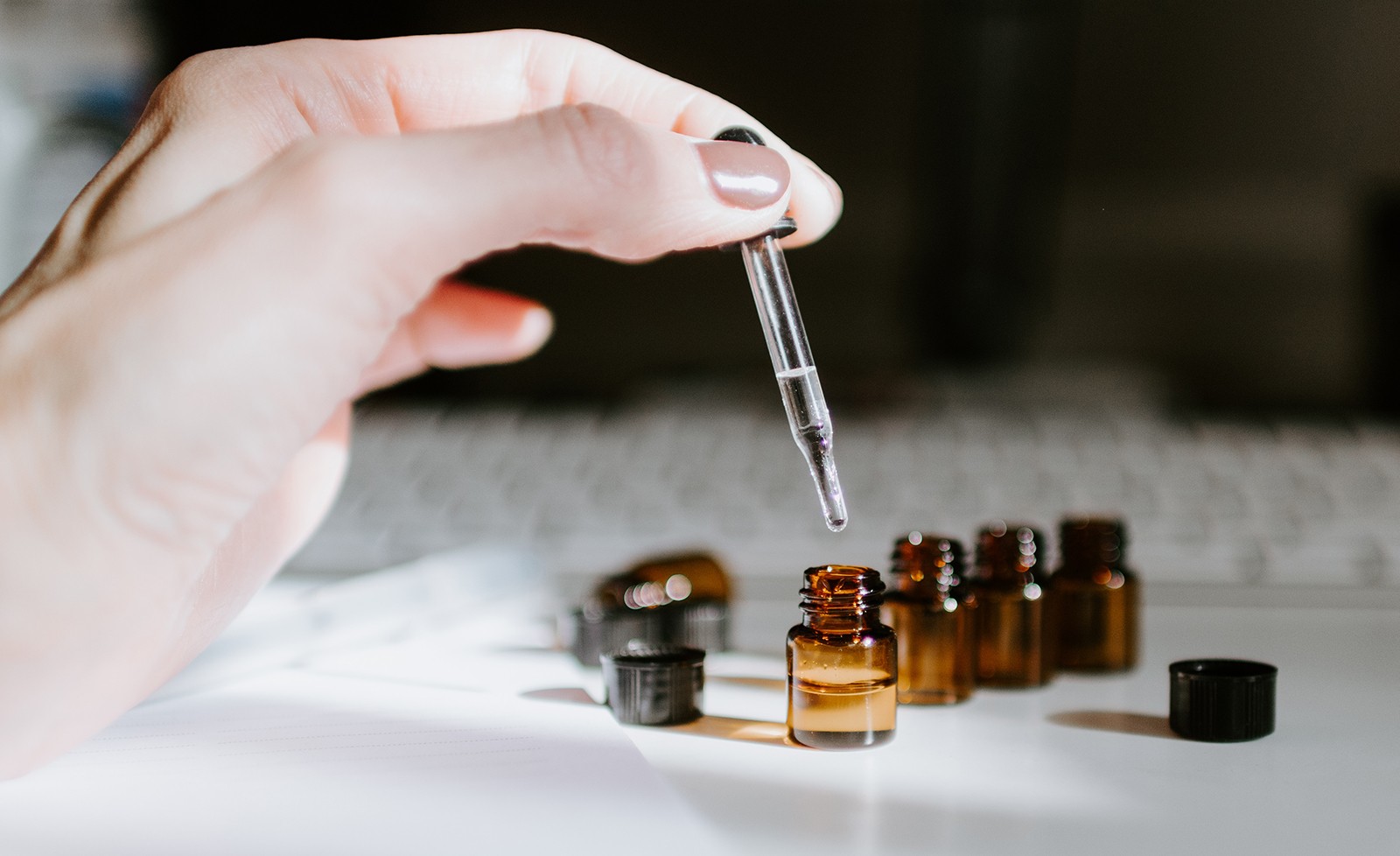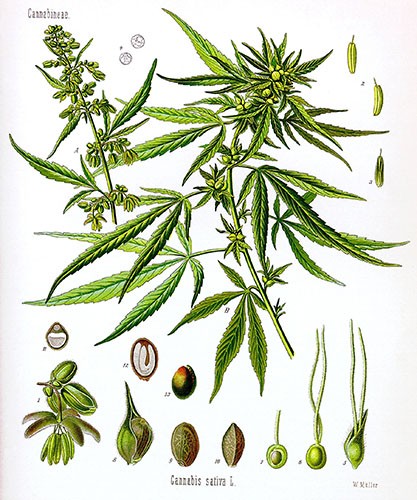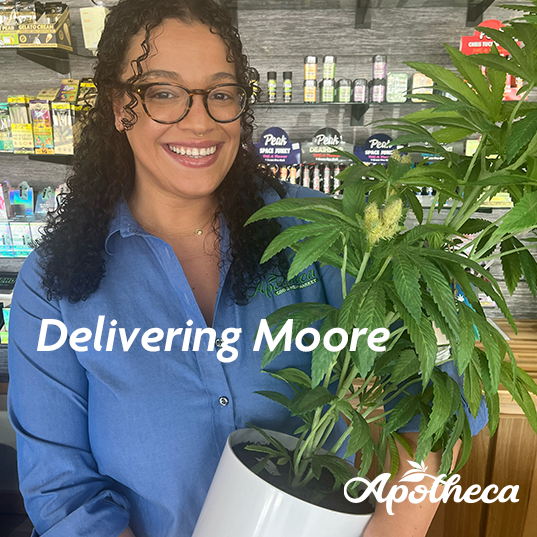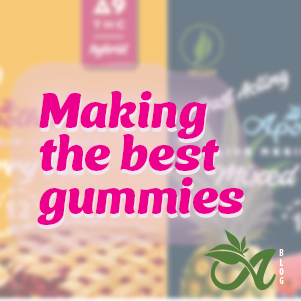
We understand that CBD products are new to a lot of people. Figuring out where to start can be daunting, especially with the amount of misinformation out there. At Apotheca, we want to help you find the best natural products to support your health and wellbeing. We’ve put together a quick guide that answers some of the most common questions we receive from first-time customers. We hope this gives you a good place to start as you begin your journey to better wellness with us.
What is CBD?
CBD stands for cannabidiol, and it is one of the many cannabinoids found in the Cannabis sativa plant (that's the scientific name for both hemp and marijuana). Cannabinoids are molecular compounds that are only found in cannabis plants. These compounds have a wide variety of effects on your body.
CBD is one of the more prevalent, well-known cannabinoids and is the subject of many ongoing scientific studies. A good portion of research is focused on the potential benefits CBD may have for people with epilepsy, but scientists have found a number of other potential applications.
Are CBD Products Legal?
The short answer is yes. All the CBD products you’ll find on our website are legal under United States federal law. That is because we source products grown from hemp plants.
Cannabis sativa is a plant grown all over the world. It is divided into two categories: marijuana and hemp. Unlike marijuana, hemp is legal to produce, sell, and possess in all 50 states thanks to the 2018 Farm Bill. However, there are some cities, counties, and states where CBD and hemp products are banned or restricted. It is always a safe bet to check local regulations before buying CBD products.
Will CBD Get Me High?
No, CBD products will not produce a high. The euphoric high associated with marijuana is the result of Delta-9 Tetrahydrocannabinol, otherwise known as THC. Unlike THC, CBD is not psychoactive.
By legal definition, hemp contains 0.3% or less THC by dry weight. This level isn’t significant enough to produce the side effects associated with marijuana (for reference, testing in 2017 shows the average marijuana plant has 42 times more THC than hemp). At Apotheca, we require all of our partner companies to submit third-party laboratory tests confirming their products have 0.3% or less THC. If that threshold is still a concern for you, we offer a wide range of THC-free products.
Why Do People Use CBD?
 Hemp has had a part in folk medicine practices around the world for thousands of years. The first recorded use of medicinal hemp dates back to roughly 2300 B.C.E. in China—when Emperor Shen Nung prescribed hemp for illnesses ranging from gout to malaria. In India, Ayurvedic physicians have used hemp in treating colds, rheumatism, diarrhea, epilepsy, pain, and dozens of other ailments.
Hemp has had a part in folk medicine practices around the world for thousands of years. The first recorded use of medicinal hemp dates back to roughly 2300 B.C.E. in China—when Emperor Shen Nung prescribed hemp for illnesses ranging from gout to malaria. In India, Ayurvedic physicians have used hemp in treating colds, rheumatism, diarrhea, epilepsy, pain, and dozens of other ailments.
People today use hemp-derived cannabidiol for many of the same ailments, and many claim CBD can be used to calm anxiety, reduce inflammation, combat insomnia, and fulfill dozens of other health needs. However, it is important to note that the United States Food and Drug Administration (FDA) has not evaluated any of these claims and it is illegal to say a product has any therapeutic benefits without explicit approval from the FDA. That’s why Apotheca doesn’t make any claims about benefits. We encourage you to do outside research and reach your own conclusions.
How Does CBD Work?
The science behind the effects CBD has on the body is still relatively new. We know cannabinoids interact with a system in the body called the endocannabinoid system—but that system was only discovered in the 1990s. This time constraint alone means it is not nearly as well-understood as other bodily systems like the nervous system and digestive system.
The endocannabinoid system essentially works as your body’s thermostat: it keeps a number of functions like mood, temperature, and inflammation at a happy medium. When something falls outside a perfect medium zone—for instance, if you're too hot or too cold—the endocannabinoid system kicks in to bring you back to equilibrium.
While the body produces compounds that adhere to the endocannabinoid receptors, cannabinoids like CBD are shown to interact with the receptors and enzymes that make up the endocannabinoid system, potentially increasing the system's effectiveness. We'll be covering the endocannabinoid system in greater detail in another post, so be sure to check back with Apotheca soon to learn more.
Which CBD Product is Right for Me?
There are a wide variety of CBD products on the market, and they all have their own advantages and drawbacks. It’s important to decide what you are looking for from cannabidiol, how regularly you plan to use it, and what delivery method makes you the most comfortable.
Here are some of the most common categories of CBD products you’ll find at Apotheca and a primer on how they’re used.
- CBD Oil Tinctures: These are the most common products you’ll see. They come in a number of sizes, strengths, and are blended with many different oils and other ingredients. Oils are typically made from extracted CBD, a carrier oil like hemp seed oil, and essential oils for flavor. Tinctures are typically taken sublingually (placing drops under your tongue) using a dropper built into the product’s cap. Oils are among the most effective at delivering CBD quickly, but some consumers don’t enjoy the taste.
- CBD Salves and Creams: These products are typically blends of CBD extract with shea butter or other common skin care ingredients. They are applied the same as any other cream or lotion, with a small amount rubbed into the skin.
- CBD Gummies and Edibles: CBD edibles are eaten like any other food, and are favored by customers who want a slower delivery method with long-lasting effects.
- Raw Hemp: Raw hemp flowers can be purchased and smoked using a pipe, rolled like cigarettes, or used in a dry herb vaporizer. Raw hemp is sometimes preferred by customers who want to avoid industrial processing of any kind and get the product in its natural form. However, it is impossible to determine an exact dose size using raw hemp flowers.
- CBD Vapes: Vaping is a highly effective, rapid way of delivering cannabidiol. Vaporizers are typically easy to use and brands offer both disposable and refillable vape oil cartridges. These devices are well-suited for customers who don't like the process of ingesting tinctures or edibles. While vape cartridges do give an exact measurement of CBD content, it is difficult to know exactly how much you are receiving with each inhalation.
What Do All These Words on the Label Mean?
Hemp product labels contain a lot of information, much of it using industry jargon that isn’t commonly understood by customers. Some of it is purely marketing, but other terms directly relate to the type and quality of the product. Here are some of the more common things you’ll come across on labels:
- Full-Spectrum: Full-spectrum means a hemp product contains all of the natural compounds found in hemp. CBD and THC are the most well-known, but there are other cannabinoids, as well as flavonoids and terpenes that occur naturally in the plant. A full-spectrum product contains all of these compounds. Many people cite the “entourage effect,” where the presence of other compounds increases the effectiveness of CBD, as a reason to use full-spectrum products.
- Broad-Spectrum: Broad-spectrum products are much like full-spectrum, except they do not contain any THC. This is accomplished by an additional refining process that removes the trace amounts of THC found in hemp. These products are available at stronger dosages, as they can increase CBD potency without also increasing THC over the legal limit. These products are THC-free and ideal for customers who are concerned with THC content but still want a wide range of cannabinoids.
- Isolate: This product is pure CBD extract, without any other cannabinoids, terpenes, or flavonoids. The isolation process typically results in a product that is 99%+ pure CBD. Isolate products are ideal for customers who are sensitive to other cannabinoids, terpenes, or phytonutrients. Isolate is sometimes added to tinctures or other products to increase their potency, but is also available powder. This allows customers to use the pure product without other additives. Since it is a pure product, CBD isolate requires smaller doses to achieve the same effect as other products.
- MG: CBD potency is measured in milligrams of CBD, although the exact measurement depends on the product. For instance, oil tincture packaging will show a high number, between 100 and 5,000mg. This measurement is for the entire bottle, meaning actual doses are much less. To figure out how much CBD is in each dropper, you'll have to do a little math (most droppers are 1ml, and bottles are typically 30ml, so you'd divide the CBD content by 30). Gummies are sometimes labeled per individual gummy, so it’s important to read packaging carefully before consumption.
Learn More With Apotheca
This guide is only a short introduction to CBD products, but we hope it answered enough of your questions to get you started. At Apotheca, we want you to make the most informed, responsible choice you can regarding what you put in your body. We’ll be using our blog space to bring you important research, history, and the latest news on CBD products. We are excited to share our knowledge and help you make the best decisions when it comes to your own wellness.



